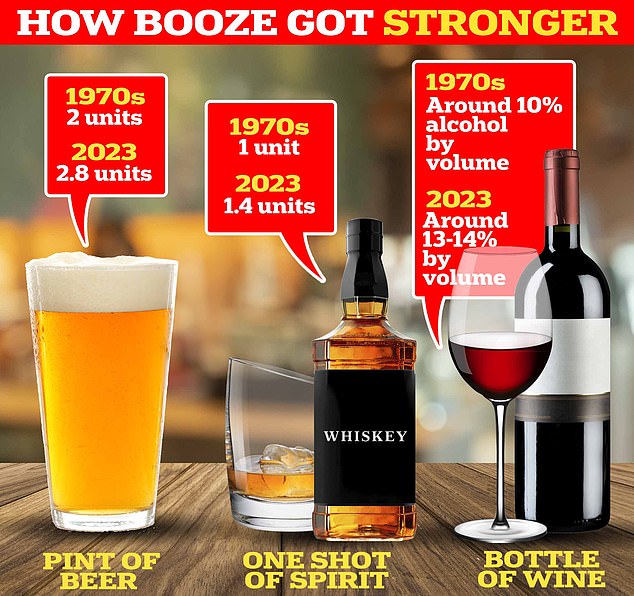Leading cancer experts have echoed public concerns that alcoholic drinks should be slapped with an explicit warning that they cause the disease, following concerning research released today.
According to the experts, warning labels could help raise better awareness of the health risks associated with alcohol, which has been linked to seven types of cancer.
Earlier this year, dozens of health organisations wrote to the Prime Minister urging him to take the advice seriously and force alcohol producers to brandish their products with ‘bold and unambiguous’ warnings.
The World Cancer Research Fund (WCRF), who coordinated the letter, said: ‘The evidence is clear: Health labelling on alcoholic drinks is urgently needed in the UK to help save lives.
‘They should carry strong, clear messages about the health risks, which include the risk of cancer, far beyond vague advice like “consume in moderation”‘, the letter continued.
Evidence cited by health experts shows that alcohol consumption significantly increases the risk of breast, bowel, stomach, head, neck, liver and mouth cancer.
Its primary cancer-causing effects are attributed to the production of inflammation and oxidative stress in the body—both of which have long been linked to the deadly disease.
In women specifically, alcohol can also increase levels of the sex hormone oestrogen which has been linked with an increased risk of breast cancer.

The NHS recommends that adults drink no more than 14 units each week – that’s 14 single shots of spirit, six pints of beer or a bottle and a half of wine
According to Cancer Research UK, the risk increases with every extra unit of alcohol per day—with eight per cent of breast cancer cases diagnosed annually in the UK directly linked to alcohol consumption.
Currently NHS guidelines advise drinking no more than 14 units of alcohol a week—the equivalent of six pints of beer or 10 small glasses of wine—though the charity says there is no safe level.
Dr Liz O’Riordan, a breast cancer specialist who has had the disease three times herself, previously told the Daily Mail: ‘I knew the risks, and I ignored them.
‘There is no safe level of alcohol consumption and people need to know that.
‘The two biggest risk factors of getting breast cancer are your age and being a woman, neither of which we can do anything about—but you can control how much you drink.
‘So if you want to reduce your risk of breast cancer, you need to cut down.’
According to the latest NHS figures, 81 per cent of adults said they had consumed alcohol in the past year – with men more likely than women to have done so (84 per cent compared to 78 per cent).
A recent report by the National Academies of Sciences, Engineering and Medicine found that even at low levels—defined as one or less drink a day for women—alcohol was associated with a 10 per cent increase in breast cancer risk.
Drinking more than three pints a day however was associated with an increased risk of mouth, neck, bowel, liver and breast cancer, according to a 2015 study of over 570 cases.
The WCRF added that just two drinks a day could significantly increase the risk of colorectal cancer—which can be found anywhere in the large bowel.
It is one of the most common types of cancer in the UK.
Experts are now calling on health care professionals to remain vigilant and provide interventions for those exceeding recommended limits, reminding people that any alcohol consumption increases the risk of cancer.
In February, the World Health Organization (WHO) declared: ‘Clear and prominent health warning labels on alcohol, which include a specific cancer warning, are a cornerstone of the right to health.’
The Department of Health and Social Care have since said: ‘We recognise the need for more action on the impact of alcohol on health.
‘For too long there has been an unwillingness to lead on this issue. Our plan for change will shift healthcare towards prevention, including through early intervention, to support people to live longer, healthier lives across the UK.’











